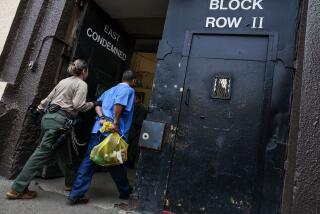Release of Hilton called very unusual
- Share via
Criminal defense lawyers said Thursday that it was unusual and even “extraordinary” for the Los Angeles County Sheriff’s Department to have released Paris Hilton to home confinement because of a medical condition.
“There are people in custody who have cancer and AIDS and severe heart problems, and they remain in custody,” said criminal defense lawyer Darren Kavinoky, whose practice is based in Woodland Hills.
Hilton left jail after three days to serve the rest of her sentence at home under electronic monitoring. Jail officials said she had an undisclosed medical condition.
Kavinoky said he once had a client in jail for a relatively minor offense who suffered severe heart problems. So the lawyer went before a judge and was able to get him released to home confinement.
“But it is really an extraordinary situation,” Kavinoky said.
Inmates who are released to home confinement typically complete their full sentences. Those in jail generally serve only a portion of their sentences, lawyers said.
To relieve jail overcrowding, the Sheriff’s Department offers inmates home confinement after they have been behind bars for a while, lawyers said.
But moving from jail to electronic monitoring at home because of a medical condition is highly unusual.
“It is out of the norm for 99.99% of the people who are in custody,” said Mary Carey, a Contra Costa County public defender for 18 years who is now in private practice in Walnut Creek, Calif.
Scott Spindel, a criminal defense lawyer who specializes in drunk driving cases, called Hilton’s transfer to home confinement “specialized treatment.”
Several lawyers said it would be particularly “extraordinary” to release an inmate to home confinement because of psychiatric problems.
“Virtually everyone who goes to jail finds it’s traumatic and they are depressed and angry,” said Neil Shouse, a former prosecutor and now a Los Angeles criminal defense lawyer.
“I have seen judges let people out of jail for open-heart surgery or a kidney transplant,” but never for emotional problems, Carey said.
To be sent home after incarceration, “it has to be a legitimate physical ailment that cannot be treated at the facility,” Shouse said.
Angela Berry-Jacoby, a criminal defense lawyer in Encino, said she tried to get home confinement for a client who was convicted of an offense related to drug sales because he was extremely anxious and had been raped in the past. The judge refused.
But 20 days into his 120-day sentence, the Sheriff’s Department offered to let him serve the rest of his sentence at home because of jail overcrowding. She said she advised the client to hang on until he was “kicked out” to make room for more serious offenders, ending his term.
“But he couldn’t handle it any more so he just did house arrest,” Berry-Jacoby said.
Hilton probably will be watched closely during her confinement, Berry-Jacoby said.
“I am sure they would love to catch her not obeying the electronic monitoring agreement,” she said.
--
More to Read
Sign up for Essential California
The most important California stories and recommendations in your inbox every morning.
You may occasionally receive promotional content from the Los Angeles Times.











